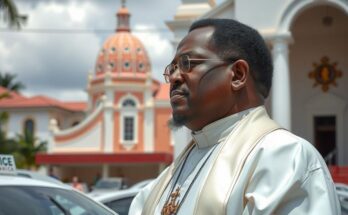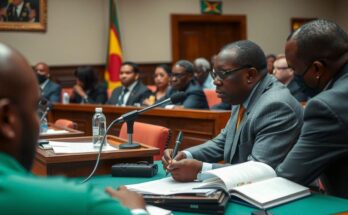In the first vice presidential debate, Republican Senator JD Vance and Democratic Governor Tim Walz discussed the Middle East conflict, climate change, and immigration issues, highlighting their opposing viewpoints. Governor Walz stressed the need for steady leadership during crises, while Senator Vance defended former President Trump’s policies as effective deterrents against international threats. The debate set the stage for a critical electoral battle, particularly in swing states, less than five weeks before Election Day.
In a highly anticipated vice presidential debate held at the CBS Broadcast Center in New York City, Republican Senator JD Vance of Ohio and Democratic Governor Tim Walz of Minnesota confronted key issues just five weeks ahead of the Election Day. The debate commenced with a handshake but quickly evolved into a discussion marked by contrasting views on significant matters such as the ongoing crisis in the Middle East, the urgent issue of climate change, and immigration policies. The opening question centered on geopolitical crises, notably the conflict in the Middle East and recent missile attacks by Iran on Israel. Governor Walz emphasized the necessity for “steady leadership”, criticizing former President Donald Trump, whom he described as “dangerous” for prioritizing trivial matters over crucial international stability. Walz contended that effective, experienced leadership was essential during this turbulent time. In response, Senator Vance defended Trump’s record, asserting that his administration had established crucial deterrents against Iran. He lamented the financial boost Iran received from the current administration, arguing that such funding was redirected towards military aggression against allied nations and potentially against the U.S. Vance advocated for a policy of “peace through strength” as the solution to international conflicts. The debate pivoted to the issue of climate change, galvanized by the devastation of Hurricane Helene, which wrought significant destruction and loss of life. Both candidates expressed sympathy for the victims, with Vance affirming that under Trump’s leadership, disaster response would prioritize American citizens. He criticized Democrats for focusing on carbon emissions instead of encouraging domestic manufacturing to support a clean economy. Governor Walz retorted by outlining the recent proactive measures taken by the Harris administration, such as substantial investments through the Inflation Reduction Act, aimed at combating climate change while enhancing energy production. Discussion flowed to immigration, where Vance called for a resurgence of Trump-era policies to address what he described as a historical immigration crisis fueled by the current administration’s reversal of such policies. He cited a surge in fentanyl entering the U.S. as a direct consequence of lax immigration enforcement. With tight races surrounding pivotal swing states, both candidates are keenly aware of their strategies as they relate to voters in regions like Pennsylvania, North Carolina, Georgia, and others. The debate concluded without premeditated opening statements, emphasizing the spontaneity and directness of articulating their respective platforms in real time while adhering to strict debate regulations. This significant political event was moderated by Norah O’Donnell and Margaret Brennan, setting the stage for a lively exchange designed to highlight each candidate’s vision for America’s future.
The debate between Senator JD Vance and Governor Tim Walz represents a critical moment in the lead-up to the elections, showcasing contrasting ideologies on pressing issues impacting the United States today. This event is particularly vital as it involves two key political figures vying for the vice presidency, intending to address the electorate’s concerns regarding international relations, environmental challenges, and immigration policies. The stakes are high, given the competitive landscape of swing states that will ultimately determine the outcome of the presidential race. Both candidates come from the Midwest, reinforcing the regional importance of their political platforms and differing viewpoints.
The vice presidential debate showcased the divergence in perspectives between Senator Vance and Governor Walz on critical national issues such as foreign policy, environmental policy, and immigration reform. As both candidates prepare for a tightly contested election, their ability to resonate with voters on these topics could be pivotal in shaping the future direction of the United States. The discussion underscored the urgency of these matters, particularly given the recent crises that have captured national attention, setting the tone for the ongoing electoral discourse.
Original Source: www.upi.com




